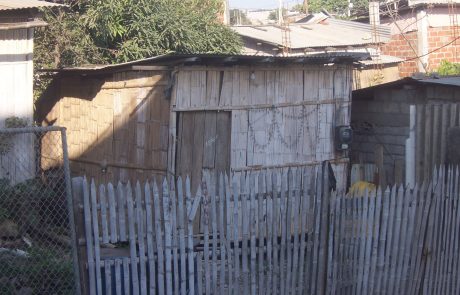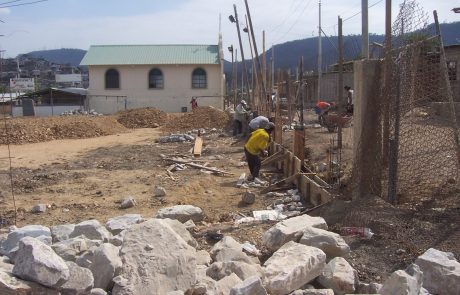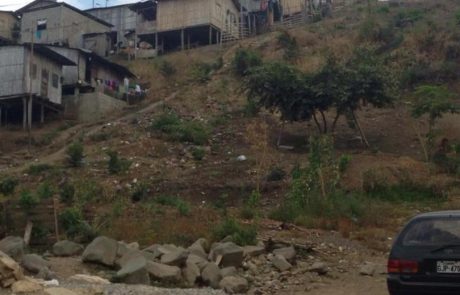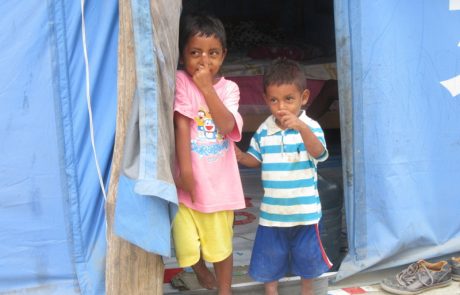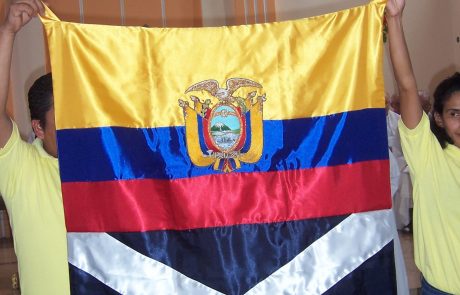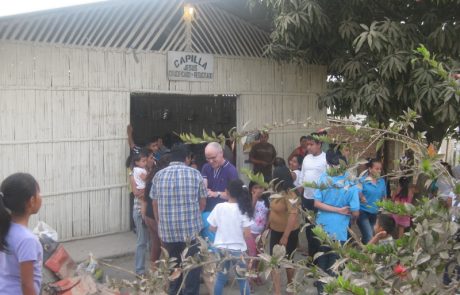Walking with the Poor – My Life On The Missions
Fr Martin Chambers
I hope you enjoy reading about my journey, and you will be touched by the people of Nueva Prosperina.
Read Fr Martin’s story and be inspired that such good things still occur in our world and in our Church.
CHAPTER TWO
So the disciples went fishing, but that night they caught nothing. Early in the morning, Jesus stood on the shore, but the disciples did not realise that it was Jesus. He called out to them, “Friends, haven’t you caught any fish?” “No,” they answered. He said, “Throw your net on the right side of the boat and you will find some.” When they did, they were unable to haul the net in because of the large number of fish.
(John 21:3-6)
Arriving in Boston I was met by Fr. Bob Thomas and Fr. Allen Aganon, a Filipino priest, who was starting the missionary life along with me. According to the statutes of the St. James’ Society, it is the job of the Director to appoint a new missionary to one of the three countries where St. James’ work (Peru, Bolivia or Ecuador) so Bob’s first task was to appoint us to a particular country: Fr. Allen was appointed to Peru and I was appointed to Ecuador. As I was in the dark about this new life I was undertaking and didn’t favour one country over the other, I was simply happy to know which country I was going to. However, I still did not know in which city I would be working in. That would be made known when I arrived there. At this stage I was still very raw after the farewell from Scotland so I was quite anxious to get going. After a few days in that city, myself and Allen headed off to Latin America where the real journey would begin.
Before beginning any Parish work we were asked to attend a six-week language and orientation course at the Maryknoll Missionary Institute at Cochabamba, Bolivia. Allen and myself arrived together on an overnight flight from Boston. Immediately we were taken to our host families. The idea of the Institute is that you have classes in the morning and then, by staying with a native family, you are forced to put into practice what you have learned in the morning. I had been lucky enough to have done my seminary training in Spain so the language was not as great a problem for me as it was for others missionaries. For those six weeks I stayed with a lovely couple – Rolando and Ely – who ran a leather-binding business in the city. They never stopped creating a fuss over me, would want to walk me to the city centre and were always concerned about what I was eating and was I eating enough. At one stage, Ely asked what I really liked for breakfast so I said that I normally had cereals, meaning Corn Flakes or the equivalent. However, ‘cereales’ in Spanish means any type of grain so from then on I had to force myself to eat tapioca, porridge and rice for breakfast. Every day. I had to learn my way around the language quickly.
One of the most beautiful events while I was in Bolivia was the wedding of their youngest daughter, Wendy, to Henry. The custom in Latin America, even among practising Catholics, is to have a civil ceremony first and then some time later to have the Church wedding. So we celebrated the civil marriage curiously enough in their own garden. For days I was involved in making food and freezing it, making fruit juice for a punch and preparing a small speech and prayer that they had asked me to do. It was a terrific day and a great introduction to what was to become the never-ending Latin American spirit for an all-night party. It was also a great way of being introduced to the way Latins organise events, in a very relaxed and laid-back way almost making things up as the go along.
During this time I had been in contact with Fr. Des Dalton who was the Co-ordinator for the St. James Society in Ecuador. He was helping me with my Visa application and had asked me to arrange a flight to Guayaquil, the largest city in the country. I had enjoyed my six weeks in Cochabamba and had had a great time with Rolando and Ely but now, having brushed up on Spanish grammar and Latin culture, I was now ready to begin my missionary activity. Waiting for me with Des at Guayaquil airport was Fr. Tom Oates, a priest of Boston archdiocese. Now I was to learn over subsequent years that some priests were met at the airport and were taken to a fancy restaurant but Des asked me if I wanted a burger. I always describe this moment as my ‘sacred Burger King moment’. For while we got stuck into the regular meal, Des slapped the table in what I was to recognise as his usual manner, and told me that I was being appointed to Nueva Prosperina, a shanty town on the outskirts of Guayaquil, the largest city in Ecuador. He said that I was to be Parish Priest there but, since there was no Parish house built, I was stay with Fr. Tom for the meantime. He said that he thought I would like the Parish but, if I didn’t settle, I could move on elsewhere. As I really had no knowledge of what I would like or where I would prefer to work, I was happy to accept. So there was no great fanfare, no great discussion and within a short space of time myself and Tom were heading off to the Parish.
Tom was to be my host for several months and as we travelled out to his Parish on that first day, I began to see the poverty in which I was about to start work. We passed through the posh district where the airport and shopping centres are. Slowly but surely, though, we left behind the wealthy areas and began to see the poorer areas – bamboo houses clinging to the side of the mountainside. And, as we turned off the motorway into our area, there were thousands upon thousands of people swarming around the market streets. We passed through a makeshift marketplace where people had simply set up a table to sell whatever they could. And over the whole sector, in the searing heat of Guayaquil was the smell of rotten food. However, as I looked out over Tom’s parish – with bamboo houses as far as the eye could see – I was very glad. This was the poverty I expected. It was the type of place my family were expecting me to come to. But, more than anything, I realised that this was to be my home for five years. Finally I was a missionary and living in a shanty town. It had been a long process to get to this point and I had had many moments of doubt and fear. Yet at this moment, as I looked out on my first night in the shanty, I could sense the gentle voice of God calming my fears and saying that this was where he wanted me to be.
Fr Martin Chambers


